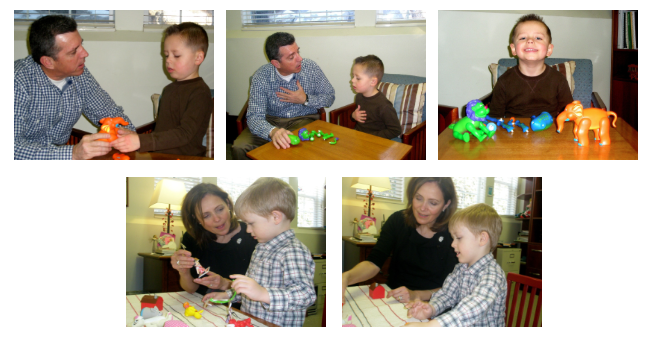Apraxia
Apraxia of speech is considered a motor speech disorder. For unknown reasons, children with apraxia have greater difficulty planning and producing the precise, highly refined and specific series of movements of the tongue, lips, jaw and palate that are necessary for intelligible speech. Apraxia of speech may also be called verbal apraxia, developmental apraxia of speech, or verbal dyspraxia. No matter what is called, the most important concept is the root word "praxis". Praxis means planned movement. So, to some degree or another, a child with the diagnosis of apraxia of speech has difficulty programming and planning speech movements. Apraxia of speech is a specific speech disorder.
A true developmental delay of speech is when the child is following the "typical" path of childhood speech development, albeit at a rate slower than normal. Sometimes this rate is commensurate with cognitive skills. In typical speech/ language development, the child's receptive and expressive skills are pretty much moving together. What is generally seen in a child wit apraxia of speech is a wide gap between their receptive language abilities and expressive abilities. In other words, the child's ability to understand language (receptive ability) is broadly within normal limits, but his or her expressive language is seriously deficient, absent or severely unclear. This is an important factor and one indicator that the child may be experiencing more than "delayed" speech and should be evaluated for the presence of a specific speech disorder such as apraxia. However, certain language disorders may also cause a similar pattern in a child. A gap between a child's expressive and receptive language ability is insufficient to diagnose apraxia.
Prognosis means how the child might be expected to do in the future if he or she receives proper treatment. The answer to this question is that outcomes vary, however, children with apraxia of speech can and do improve! The factors that appear to contribute to prognosis include:
With appropriate help, most chidden with apraxia of speech make wonderful gains in their expressive speech ability. However, it is also true that in some situations, despite everyone's best attempts, a child may not evolve to be primarily a verbal communicator.
A true developmental delay of speech is when the child is following the "typical" path of childhood speech development, albeit at a rate slower than normal. Sometimes this rate is commensurate with cognitive skills. In typical speech/ language development, the child's receptive and expressive skills are pretty much moving together. What is generally seen in a child wit apraxia of speech is a wide gap between their receptive language abilities and expressive abilities. In other words, the child's ability to understand language (receptive ability) is broadly within normal limits, but his or her expressive language is seriously deficient, absent or severely unclear. This is an important factor and one indicator that the child may be experiencing more than "delayed" speech and should be evaluated for the presence of a specific speech disorder such as apraxia. However, certain language disorders may also cause a similar pattern in a child. A gap between a child's expressive and receptive language ability is insufficient to diagnose apraxia.
Prognosis means how the child might be expected to do in the future if he or she receives proper treatment. The answer to this question is that outcomes vary, however, children with apraxia of speech can and do improve! The factors that appear to contribute to prognosis include:
- Individual characteristics of the child; these include receptive ability, cognitive ability, desire to communicate (communication intent).
- Age at which appropriate treatment is begun (preschool age being desirable), and attention span.
- The extent to which other medical, speech and/ or language issues are present.
- The extent of which therapy is tailored to the unique issues present in the child.
- The extent of family participation and involvement in therapy and follow-through at home.
With appropriate help, most chidden with apraxia of speech make wonderful gains in their expressive speech ability. However, it is also true that in some situations, despite everyone's best attempts, a child may not evolve to be primarily a verbal communicator.


